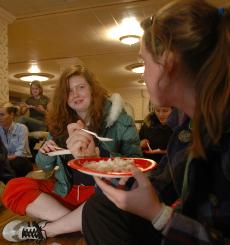Volunteers address poverty

Maura Cotter, left, and Katie Prendergast, both freshmen in LAS, eat rice at the Hunger Banquet at the Illini Union on Tuesday, November 14. The banquet was organized in order to bring awareness about poverty, free trade and volunteer opportunities to stu Roxana Ryan
Nov 15, 2006
Last updated on May 12, 2016 at 06:22 a.m.
Every 2.9 seconds a child under the age of five dies from a preventable disease, including malnutrition, and nearly one in five children in the U.S. live below the poverty line, according to Oxfam statistics.
The Oxfam America Hunger Banquet – sponsored by the University Habitat for Humanity chapter, Volunteer Illini Projects and the Illini Union Community Connections – brought the issues of hunger and homelessness to more than 30 students at the Union in recognition of National Hunger and Homelessness Awareness Week, taking place from Nov. 12 to Nov. 18.
“I really hoped to just raise awareness to these issues,” said Sara Gibbs, Habitat for Humanity member and organizer of the event. “We don’t really realize that 21,000 people in Champaign County live below the poverty line.”
Four people sat at a formally set table with delicately folded napkins, glassware and a flower center piece. They represented the 15 percent of the world in the upper class that have enough money to adequately feed, clothe and shelter themselves.
Get The Daily Illini in your inbox!
The other 17 people sat on either chairs or on the floor, representing the 25 percent of the world “on the edge” and the 60 percent of the world’s population that live in extreme poverty.
Servers dressed in white dress shirts and black pants brought those at the table a full chicken and mashed potato dinner. The four passed rolls around the table and nervously ate in silence as those on the floor shared three paper plates of plain white rice.
“It’s probably the most awkward meal I’ve eaten,” said Myrna Rivas, freshman in LAS, who was sitting at the high-income table. “I probably feel the worst because my friend is there on the floor.”
But when they thought no one was really looking, the four at the table passed the rolls to those on the floor.
Some of the participants came to support friends who were running the event. Others, like Amar Behera, graduate student, have seen poverty and homelessness first hand.
“Well coming from a country like India, I was middle class,” Behera said. “I was in Bombay and I’ve seen the slums and seen the people die of hunger.”





